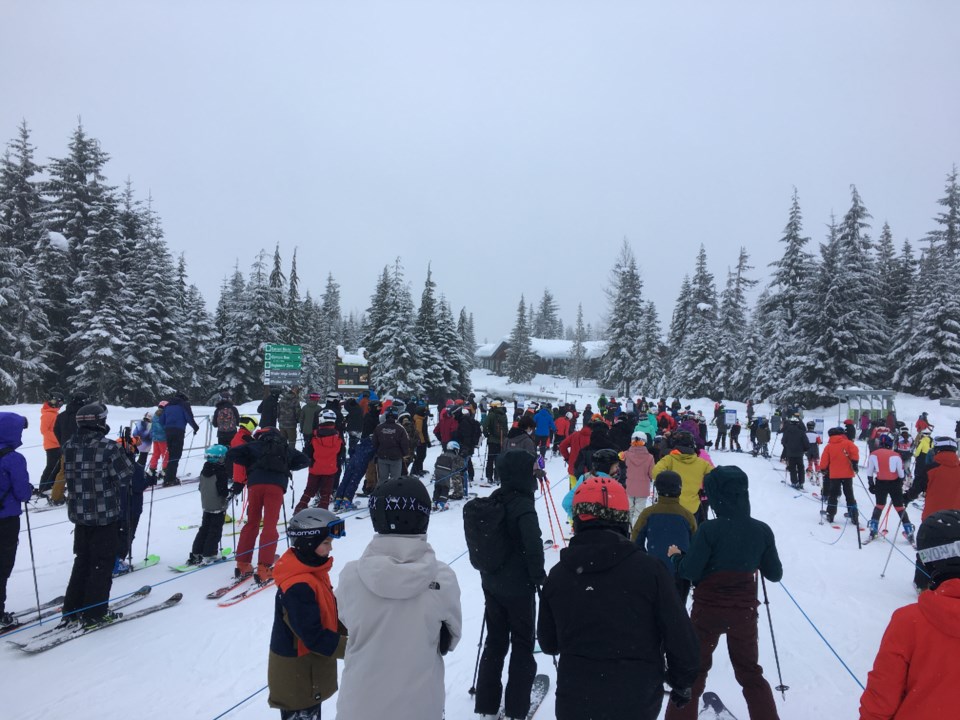It was with interest that the community heard last week that the province, Vancouver Coastal Health, stakeholders and our local government are in talks to address, “way, way, way too many cases” of coronavirus in Whistler, according to B.C. Health Minister Adrian Dix.
Of course the community has been commenting on this and asking for action for weeks.
Many have been calling for months for the Sea to Sky Highway to be closed to non-local traffic, or for Whistler Blackcomb, accommodation providers and others to only take bookings from people who could legitimately call Whistler a local destination.
While the intent of these suggestions is treated sympathetically on all fronts, there is also the understanding that Whistler’s workers need the resort to stay open for economic reasons.
Whistler is by no means alone in experiencing rising case numbers of coronavirus as a ski resort, though it is by far the largest, registering 547 cases from the beginning of the year to Feb. 5. Officials in Big White (235 reported cases of COVID-19, as of Feb. 5) told Global News recently that the resort estimates losses at $7.3 million since the November pandemic advisory, not including such things as food and beverage. Occupancy is at about 14 per cent compared to a normal of about 88 per cent for this time of year.
Tourism Whistler has said previously that Whistler was at 27-per-cent capacity in December, with visitation taking a further plunge once the calendar changed over to 2021. (January numbers have not been finalized.)
And while Whistler Blackcomb’s parent company Vail Resorts won’t share local-mountain financials or skier numbers, last month it reported that season-to-date total skier visits were down 16.6 per cent across the company compared to the same period the year prior.
Vail Resorts’ season-to-date total lift ticket revenue, including an allocated portion of season pass revenue for each applicable period, was down 20.9 per cent; season-to-date ski school revenue was down 52.6 per cent and dining revenue was down 66.2 per cent and retail/rental revenue for North American resort and ski area store locations was down 39.2 per cent.
On Feb. 5, Fernie announced its own cluster of COVID-19 cases, with more than 97 cases at that time.
According to health authorities, cases in ski resorts are mainly spreading due to communal living and social activities. In Whistler’s case, it could be argued that we are actually spreading it now to the visitors.
The pandemic is taking a toll on everyone in Canada and on every business and sector; we know that.
But there is no escaping that places like Whistler (or Fernie or Revelstoke or Big White or Tofino), reliant as they are on one industry, tourism, are standing on a precipice in a way more-diversified towns are not.
We also need that mix of destination and rubber-tire traffic to return in order to get back on our feet long-term.
So, getting our vaccine program kicked into high gear should be priority. (As of Feb. 4, our vaccine dose rate per 100 people was 2.70, making Canada 34th in the world. Israel is No. 1 at 58.53.)
Failing to address the delays and challenges of the vaccine rollout here could have serious political fallout as the likelihood of a federal election looms.
For now, the Liberal Party is ahead in the polls, but if the current delays continue to plague the immunization program, that could change—threatening the Prime Minister’s hopes of getting a majority.
Clearly, holding an election while the country remains firmly in the grip of the pandemic will not be a popular decision, though we have already seen several, including right here in B.C. And Elections Canada is preparing with legislation to allow multi-day weekend voting, more mail-in voting, and tailored voting services in long-term care facilities to suit “unique circumstances.”
Before we have to deal with any election, we will see a federal budget.
It’s tempting to want to hunker down and ignore it. But just as most of us have done the right thing and followed the public-health guidelines to fight the spread of COVID-19, we should consider the budget and weigh in on how our tax dollars are spent. Right now you can visit letstalkbudget2021.ca to fill out a questionnaire about what is most important to you. Take the time to do this.
When you do, I would urge you to speak up for our environment and changes that need to be supported to fight the climate crisis.
Last month, Prime Minister Justin Trudeau officially directed Canada’s finance minister to create a recovery plan from COVID-19 that includes “actions to transition to a greener, more inclusive and more prosperous economy.”
Said environmental activist (and Pique columnist) David Suzuki: “The government is mapping out a $100-billion recovery plan. We need to ensure that investing in nature and a low-carbon economy is at its foundation.”




